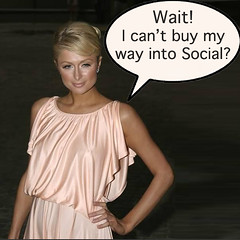I am having an interesting discussion on David Armano’s blog with someone called "mookie". While looking through the comments on this post, I noticed that mookie had commented on the fact that blogs and social media were just communications tools and were too impersonal.
Since then, the conversation has moved on a little, and mookie has asked about whether the "semi-social" amongst us can also be considered members of the community. How do we demonstrate our membership? What happens if you don’t have a blog or a photo, or if you are shy and retiring? What happens if you just don’t have the time or the interest?
These are difficult questions, for undoubtedly, a blogging community does not exist without readers. And those readers will engage with topics and issues online and off — in fact, most of us will discuss topics with our friends over coffee in far more detail than we will on our own blogs. This is what I do when I meet my friends for coffee on Friday mornings.
But one of the things that I love about writing a blog is that we disclose more of our selves than we realise. It is why I read and it is also why I write (though sometimes I write with a half held breath). Sometimes a friend will recount something I had written and I am surprised at what they know. And because I have written and they have interpreted, there is a trade-off — a gift of sorts.
In the first instance, the gift is our name. When I first began writing this blog I hid behind its name. But gradually I was coaxed from the shadow of my own invention. Another breath half held. Another step into the arms of an unknown community.
When we read, I believe that we are seeking that nugget of truth. Our reading ears are finely attuned to this and they seek it at every word. It is what raises the hairs at the back of our necks. But the same is true with writing — but even when we are writing our selves into existence, it is only one version of our self, our life. As Helene Cixous would say, it is "the blind person’s version".
When I read the writers that I love (yes, this includes blogs), I am reading emotionally. I listen through the words. I reach for the ideas and I connect the elements, building my own story based on the words in front of me and the memories I have of the thousand other posts, emails and conversations we have had. And as these piece together, sometimes, I realise that I have moved beyond a simple relationship with this person. In sharing my time and my thoughts, this person has come into my world, and I into hers. Perhaps this may be a strange, unrequited type of gift … but it is a gift nonetheless.
Recently, at an event where I was able to actually meet some of my blogging friends, the truth of this became evident. Despite the fact that many of us had never physically met before, we felt that we knew each other. There was already a history of shared experience that transcended mere words.
My favourite definition of community is that you will be missed if you are not "there". There certainly were folks missing from this event … but you cannot be missed if no one knows your name or how to reach you. Ask the Tangerine Toad, life is much brighter out of the shadow of the toadstool. Time to take another half breath.





